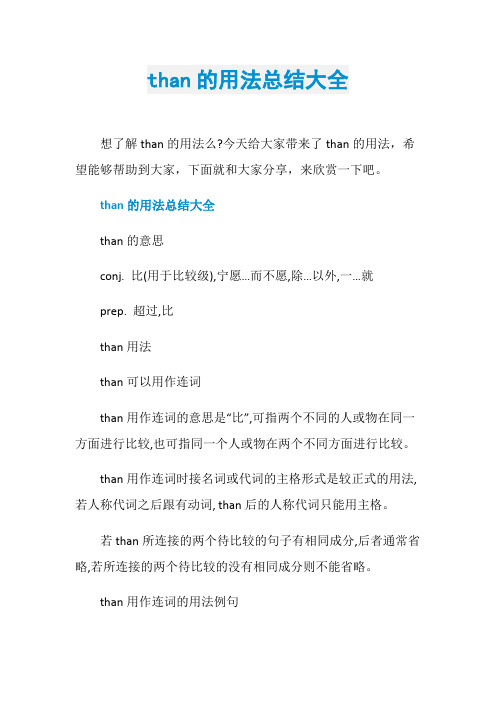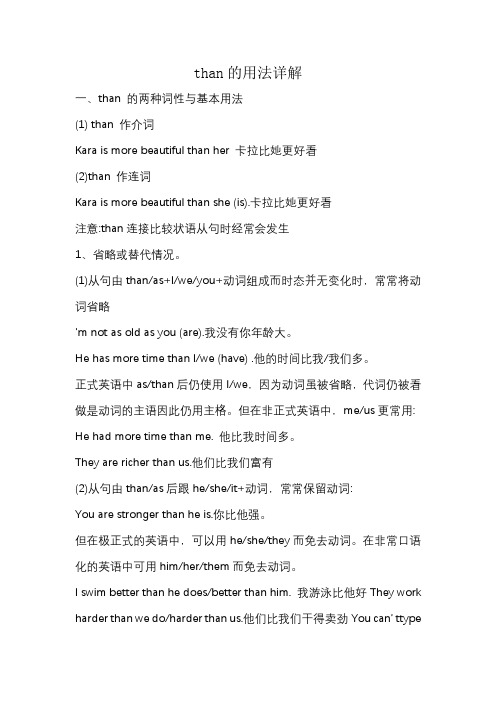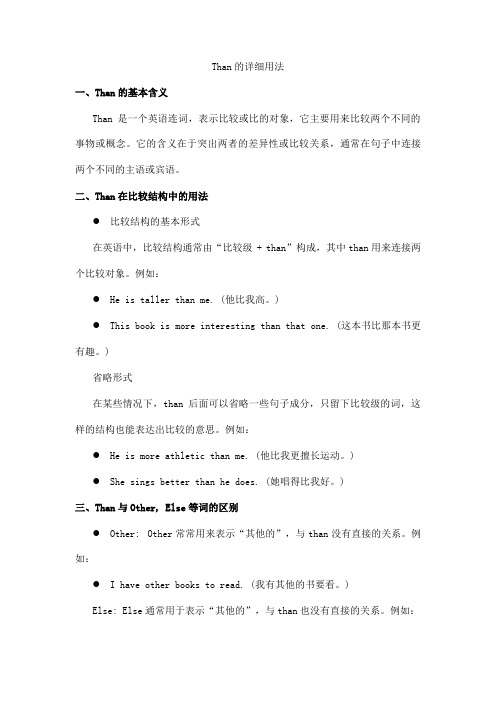than的几种用法
- 格式:pdf
- 大小:123.84 KB
- 文档页数:2

than的用法一级标题:Than的基本含义与用法介绍Than是一个常见的单词,它在英语中常用于比较两个事物或者具有比较性质的关系。
在句子中,than通常作为一个连接词,引导着一个比较从句。
它可以表达出某一事物在某一方面上超过或不如另一事物。
除此之外,than还可作为介词使用。
下面将详细介绍than在不同情况下的几种常见用法。
二级标题1:表示数量比较当我们需要进行数量或程度上的比较时,可以使用than来构建比较结构。
这种情况下,than引导后面的从句,说明两个事物或人在数量上存在差异。
例如:1. He is taller than his brother.他比他弟弟更高。
2. She has more friends than I do.她比我有更多的朋友。
从以上例子可以看出,than连接了主体和被比较对象,并突显出二者之间具体的差距。
二级标题2:表示选择、偏好或倾向除了表示数量上的比较外,than还可以用于表示选择、偏好或倾向。
通过使用含有than的结构,我们可以表达对某种选择或偏好更加倾向或喜欢。
例如:1. I prefer tea than coffee.我更喜欢茶而不是咖啡。
2. She would rather stay home than go out.她宁愿呆在家里也不愿意出去。
从以上例子可以看出,than在这种情形下用来比较两个选项,并强调一个选择被优先考虑。
二级标题3:表示与过去状态的对比除了用于表示数量和选择上的比较外,than还可用于表达当前事物与过去状态的对比。
通过使用than,我们可以描述事物发生了变化或者相对于过去提供一种新的情况。
例如:1. He is wealthier now than he was ten years ago.他现在比十年前更富有。
2. This is a better job than his previous one.这是一份比他之前的工作更好的工作。

than的用法总结大全想了解than的用法么?今天给大家带来了than的用法,希望能够帮助到大家,下面就和大家分享,来欣赏一下吧。
than的用法总结大全than的意思conj. 比(用于比较级),宁愿…而不愿,除…以外,一…就prep. 超过,比than用法than可以用作连词than用作连词的意思是“比”,可指两个不同的人或物在同一方面进行比较,也可指同一个人或物在两个不同方面进行比较。
than用作连词时接名词或代词的主格形式是较正式的用法,若人称代词之后跟有动词, than后的人称代词只能用主格。
若than所连接的两个待比较的句子有相同成分,后者通常省略,若所连接的两个待比较的没有相同成分则不能省略。
than用作连词的用法例句She was older than I was.她年纪比我大。
I was inspired to work harder than ever before.我受激励比以往任何时候都更加努力地工作。
This street is four times shorter than that one.这条街道比那条短四倍。
than可以用作介词than用作介词时意思为“与…相比”,用于名词或代词前表示比较关系,也可用于在度量衡方面的比较。
than用作介词时其后接名词或代词的宾格形式是非正式用法,若人称代词之后有all, both则通常用宾格。
than用作介词的用法例句This street is four times shorter than that one.这条街道比那条短四倍。
John is more diligent than anyone else in his class.约翰比班上其他的同学用功。
than用法例句1、Their replies were no more than grunts of acknowledgement.他们所谓的回答不过是表示承认的咕哝罢了。

than的用法详解一、than 的两种词性与基本用法(1) than 作介词Kara is more beautiful than her 卡拉比她更好看(2)than 作连词Kara is more beautiful than she (is).卡拉比她更好看注意:than连接比较状语从句时经常会发生1、省略或替代情况。
(1)从句由than/as+l/we/you+动词组成而时态并无变化时,常常将动词省略’m not as old as you (are).我没有你年龄大。
He has more time than l/we (have) .他的时间比我/我们多。
正式英语中as/than后仍使用I/we,因为动词虽被省略,代词仍被看做是动词的主语因此仍用主格。
但在非正式英语中,me/us更常用: He had more time than me. 他比我时间多。
They are richer than us.他们比我们富有(2)从句由than/as后跟he/she/it+动词,常常保留动词:You are stronger than he is.你比他强。
但在极正式的英语中,可以用he/she/they而免去动词。
在非常口语化的英语中可用him/her/them而免去动词。
I swim better than he does/better than him. 我游泳比他好They work harder than we do/harder than us.他们比我们干得卖劲You can’ ttypeas fast as I can/as fast as me. 你打字不如我快(3)当than/as的前后所用动词相同时,常可以用助动词代替第二个动词:l earn less than he does. 我比他钱挣得少He knows more than I did at his age. 他要比我在他这个年龄时懂得多City dwellers have a higher death rate than country people do.城市居民比乡里人死更高。

than的用法总结一、介绍Than的用法二、Than的比较级和最高级用法三、Than的其他常见用法四、总结一、介绍Than的用法Than是一个常见的单词,在英语中有多种用途。
作为一个连词,than表示比较关系,在句子中连接两个并列成分,并表明第二个事物与第一个事物之间的差异或相似性。
它在句子中起到比较和对照的作用。
二、Than的比较级和最高级用法1. 比较级:Than可与形容词或副词连用,表示两者之间相对程度上的差异。
例如:- She is taller than her sister.- He runs faster than his friends.2. 最高级:我们可以使用than来表示最高级形式,将某人或某事物与同类中所具有相对低层次特征进行对比。
例如:- He is the tallest boy in his class.- This is the best cake I have ever tasted.三、Than的其他常见用法1. Than引导从句:当一个从句与than连接时,意味着该从句提供了比较中所需的信息。
例如:- She works harder than anyone else in the office.2. Than引导非限制性定语从句:当我们想要进一步描述某人或某物,并与其他人或物进行比较时,可以使用than引导非限制性定语从句。
例如: - My sister, who is taller than me, loves playing basketball.3. Than也可以用作介词,表示“除了”、“比”等含义,常与不定式连用。
例如:- I have no choice other than to accept the offer.- She has more things to worry about than her grades.4. 在固定短语中:Than也出现在一些固定的短语中,如"rather than"、"other than"等。

Than语法引言Than是一个常见的英语词汇,用于比较两个事物之间的差异或者优劣。
在句子中,than通常用来引出一个比较级形容词或副词,用于比较两个事物的不同之处。
本文将详细探讨than语法的使用方法和注意事项。
一、Than的基本用法Than通常用于比较两个事物的不同之处,以下为几种常见的使用情况: 1. 比较两个人或物体的特征或性质: - He is taller than his brother. - This book is more interesting than that one. 2. 比较两个人或物体的能力或水平: - She runs faster than him. - The new model is more efficient than the old one. 3. 比较两个人或物体的行为或态度: - She is more patient than her sister. - He is more responsible than his classmates.二、Than与比较级形容词和副词的搭配Than通常与比较级形容词和副词连用,用来表示一个事物相对于另一个事物的程度或程度差异。
以下为一些常见的比较级形容词和副词的搭配: 1. 形容词的比较级搭配: - tall - taller than - interesting - more interesting than - intelligent - more intelligent than - beautiful - more beautiful than 2. 副词的比较级搭配: - quickly - more quickly than - slowly - more slowly than - easily - more easily than - carefully - more carefully than三、Than与否定形式的搭配在比较中,有时候我们需要表达某个事物不如另一个事物。

Than的详细用法一、Than的基本含义Than是一个英语连词,表示比较或比的对象,它主要用来比较两个不同的事物或概念。
它的含义在于突出两者的差异性或比较关系,通常在句子中连接两个不同的主语或宾语。
二、Than在比较结构中的用法●比较结构的基本形式在英语中,比较结构通常由“比较级 + than”构成,其中than用来连接两个比较对象。
例如:●He is taller than me. (他比我高。
)●This book is more interesting than that one. (这本书比那本书更有趣。
)省略形式在某些情况下,than后面可以省略一些句子成分,只留下比较级的词,这样的结构也能表达出比较的意思。
例如:●He is more athletic than me. (他比我更擅长运动。
)●She sings better than he does. (她唱得比我好。
)三、Than与Other, Else等词的区别●Other: Other常常用来表示“其他的”,与than没有直接的关系。
例如:●I have other books to read. (我有其他的书要看。
)Else: Else通常用于表示“其他的”,与than也没有直接的关系。
例如:●What else do you want to know? (你还想知道什么其他的?)四、Than在固定搭配中的使用●比较级 + than + 不定代词:这种结构表示某个事物的某个方面超过其他事物。
例如:●She has more money than anyone else. (她比其他任何人都有钱。
)比较级 + than + 副词:这种结构用于表示比较关系,通常放在动词后面。
例如:●She studies harder than ever before. (她比以前更加努力地学习。
)倍数 + 比较级 + than:这种结构用于表示某事物是另一事物的几倍大小或程度。
than介词用法
than是一个常用的介词,表示比较中的“比”。
它通常与形容词或副词连用,用于比较两个事物的不同之处。
比较结构中,than后面可以接名词、代词、动词的现在分词或过去分词。
下面是一些than 的用法:
1. 比较两个人或事物的不同之处:He is taller than me.(他比我高。
)
2. 表示一种选择:I would rather stay at home than go out.(我宁愿呆在家里也不愿出门。
)
3. 表示某事物的数量或程度:The temperature is higher today than yesterday.(今天的温度比昨天高。
)
4. 表示与某人或某事物相比较:She is smarter than her sister.(她比她姐姐聪明。
)
5. 用于否定句中表示不同的用法:I don't have more friends than you.(我没有比你更多的朋友。
)
6. 在某些常见的表达中,than也有特殊的用法,如:rather than (而不是)、other than(除了)等。
总之,than是一个比较常用的介词,在英语中扮演着重要的角色。
掌握than的用法,可以更准确地表达自己的意思,使语言表达更加流畅自然。
- 1 -。
than的用法小结一、than的基本意思和用法Than是一个常见的英语单词,主要用作介词、连词或副词。
它和比较级形容词或副词一起使用,表达“比……更”这样的比较关系。
接下来将从不同的角度总结than的用法。
1. 作为介词当than被用作介词时,其后通常跟随一个名词短语或动名词短语,并表示一种比较关系。
例如:- She is taller than her sister.(她比她姐姐高。
)- He earns more money than his colleagues.(他赚的钱比他的同事多。
)2. 作为连词当than被用作连词时,它连接两个分句,引出一个比较级形式。
例如:- She is smarter than I am.(她比我聪明。
)- He works harder than his coworkers.(他工作比同事们更努力。
)3. 表示时间顺序有时候,than可以表示时间上的先后顺序,相当于“然后”。
例如:- First, cook the pasta, than add the sauce.(首先,煮面条,然后加酱汁。
)二、其他常见表达方式除了基本意义以外,than在某些情况下还有额外用法。
1. no sooner...than...这个短语结构用于表示“刚……就……”。
例如:- No sooner had I sat down than the phone rang.(我刚一坐下,电话就响了。
)2. other than这个短语意思是“除了……之外”,常常用来介绍一个例外情况。
例如:- She doesn't have any hobbies other than reading.(除了阅读,她没有其他的爱好。
)3. rather than这个短语相当于instead of,意为“而不是”。
例如:- I would prefer tea rather than coffee.(我更喜欢茶而不是咖啡。
than的用法归纳总结than是一个常用的连词,常用于比较两个事物、人或者状态之间的程度、差别、相似等情况。
than的具体用法可以分为以下几种:1. 比较两者之间的数量、程度等:A+比较级+than+B。
例如:He is taller than his brother.2. 比较两者之间不同的特点、品质等:A+形容词+than+B。
例如:She is more intelligent than her classmates.3. 比较两个动作或状态之间的优劣、远近、高低的关系:A+动词原形+than+B。
例如:I would rather stay at home than goout to see a movie.4. 表示“不是……而是……”的转折关系:否定词+比较级+than。
例如:He is not more intelligent than me.5. 表示与其它事物、人的区别:A is different from/to/ than B。
例如:His opinion is very different from/to/ than mine.6. 表示与其它事物、人相比有一个更高的程度:A is more +形容词/副词+than B。
例如:She is more beautiful than her sister.7. 表示与其它事物、人相比有一个更低的程度:A is less+形容词/副词+than B。
例如:This car is less expensive than that one.需要注意的是,than不仅用于比较级中,还可以和as连用表示“和……一样”,例如:She is as tall as her father。
than用法小结than是英语中的副词,有时也可以作为介词使用。
以下是than 的常见用法小结:1. 作为比较级的标志:- 在比较级中,than用来比较两个事物或人的不同之处,表示“比...更”或“与...相比”。
例如:He is taller than his brother.(他比他的兄弟更高。
)2. 引导从句:- than可以引导一个从句,用来表示一个相对的情况或比较。
例如:I’d rather stay at home than go out.(我宁愿呆在家里,也不愿出去。
)3. 引导表示近似数值的短语:- than用来引导一个短语,表示近似数值。
例如:It's ten minutes to six.(距离六点还有十分钟。
)4. 表示选择:- than用来表示一种选择或偏向,常与rather或prefer连用。
例如:I would rather go swimming than go shopping.(我宁愿去游泳,也不愿意去购物。
)5. 比较程度:- than可以用来表示比较程度,表示“比...更...”或“与...相比...”。
例如:She is more intelligent than you.(她比你更聪明。
)6. 在否定句中使用:- than可以用来在否定句中表示“不如”。
例如:She is no better than her sister.(她不如她的姐姐好。
)7. 与rather连用表示情感倾向:- than可以与rather连用,表示对某种情感的倾向或态度。
例如:I would rather die than give up.(我宁愿死也不愿放弃。
)8. than用于除了上述情况以外的其他场合:- than在英语中还有许多其他用法,如在hardly...than...(几乎不...就...)、other than(除了...以外)等。
总之,than作为副词和介词,有着丰富的用法。
在英语学习中,than 是出现频率较高的一个词,用法也较为复杂,因此掌握than 的用法不仅要从词法的角度去考虑,而且要注意其构成的句型和短语,本文就其所在的句型及短语进行语义分析,以期在英语学习中对大家有所帮助。
一、用于表示比较的句型中(一)单纯表示比较级的句型:A +谓语+形容词或副词的比较级+than +B 。
例如:Mary sings better than anyone else in the class.玛丽比班上任何人唱得都好。
(二)表示比较倍数的句型:A +谓语+数词+times +形容词/副词的比较级+than +B 。
例如:This classroom is twice bigger than that one.这间教室是那间教室的两倍大。
(三)用比较级结构表示最高级的含义的句型:1.主语+谓语+比较级+than +the others/anyone else/any (other )+单数名词/any of the others/any of the other +复数名词。
例如:(1)China is larger than any other country in Asia.中国比亚洲其他任何一个国家都大。
(2)He is older than any of the other boys in his class.他比他班上任何同学年纪都大。
2.“No one +谓语+比较级+than +sb.”或“No other +单数名词+谓语+比较级+than +sb./sth.”。
例如:(1)No one can be more fit for his office than he is.没有人比他更适合担任这个职务了。
(2)No other river is longer than the Changjiang?River in Chi -na.在中国,没有一条河流比长江更长。
二、在表意愿的句型中构成would do sth.rather than do sth.;would rather do sth.than do sth.或prefer to do sth.rather than do sth.结构,意为“宁愿做……而不愿……”。
例如:(1)They would rather starve than give way.他们宁愿饿死也不妥协。
(2)The children would walk there rather than take a bus.孩子们宁愿步行去那里而不愿乘公共汽车。
(3)He preferred to stay at home rather than go with us.他宁愿呆在家里,而不愿跟我们一起去。
三、与than 构成的短语(一)No sooner ...than 意为“一……就……”,引导时间状语从句(从这里可以知道,no sooner 后面是主句;than 后面是从句),且当此结构置于句首时,表示强调,主句要倒装。
例如:(1)I had no sooner reached home than it began to rain.我一到家天就下起雨来。
(2)No sooner had I reached home than it began to rain.我一到家天就下起雨来。
注意:No sooner ...than 一般用来描述做过的事情,它不能用于表示将来的事。
(二)more than 和less than 。
1.more than 可放在数词之前,意为“超过;不止;以上”,用于此意义时可与over 互换使用。
例如:Altogether more than 70percent of the surface of our planet is covered by water.整体说来,我们这个星球表面有70%以上都为水所覆盖。
2.more than 可放在名词之前,表示“不只是;不仅仅”。
例如:(1)Hibernation is more than sleep.冬眠不仅仅是睡眠。
(2)Bamboo is used for more than building.竹子不只是用于建筑。
3.more than 用于形容词或副词前,作“非常;十分”解,与very 和much 同义。
例如:(1)She is more than careful in doing things.她做事非常细心。
(2)In class ,he listens more than attentively.在课堂上,他听讲十分认真。
4.more than 之后接含有can 的从句时,常表示否定意义。
此时,从句中的谓语动词必须是及物动词,并且与句子的主语呈现逻辑上的动宾关系。
例如:This secret is more than we can let out.这个秘密我们是不能泄露的。
(主语secret 是let out 的逻辑宾语)比较:less than 后面接形容词、副词时,意为“不;很少;不到”,具有否定意义。
例如:(1)We were busy and less than delighted to have companythat day.那天我们很忙,不高兴有客人来。
(2)The young man is less than twenty years old.这个年轻人不到20岁。
(三)more...than 和less...than 。
1.more...than 意为“与其……不如……”;“是……而不是……”,常可与“rather than ”或“not so much...as ”互换使用。
例如:(1)The elephant ’s nose is more like a spear than anything else.=The elephant ’s nose is like a spear rather than anything else.=The elephant ’s nose is not so much like anything else aslike a spear.与其说大象的鼻子像别的什么东西,不如说它像一根长矛。
(2)He is more poltroon than cautious.与其说他谨慎,不如说他是怯懦。
2.more ...than 之后接含有can 的从句时,同样表示否定意义。
例如:Tom has more insolence than I can stand.=Tom ’s insolenceis more than I can stand.汤姆的傲慢使我难以忍受。
比较:①less ...than 意为“不像……;不是……”。
例如:Joseph is less honest than his brother.约瑟夫不像他兄弟那样诚实。
②比……少,不如……多。
如:We drink less coffee than tea.我们喝咖啡不如喝茶多。
③与其……不如……。
如:I regard him less as my teacher than as my friend.与其说我把他当作老师,不如说我是把他当作朋友。
注:表示此义时,可与more ...than 结构替换(但要注意词序的变化)。
如:He is less a teacher than an expert./He is more an expert than a teacher.与其说他是老师,不如说他是专家。
(四)no more than 和no less than 。
no more than 用在名词或数词前,意思为“只有;仅仅;不过(=only ;just )”,例如:His school education added up to no more than one year.他所受的学校教育总共不过一年的时间。
比较:no less than 意为“不少于;不下于……之多;多达……”。
例如:In that battle ,we wiped out no less than twenty thousand ene -(楚雄师范学院外语系,云南楚雄675000)侯丽香艾桂琴than 的几种用法111mies.在那一次战役中,我们消灭的敌人不下20,000人。
There is no less than five hundred person at the meeting.不少于五百人在开会。
(五)not more than 和not less than 。
not more than 常用于数词之前,意为“至多;顶多;不超过”,其意义与at (the )most 相同。
例如:I ’ll stay here not more than three days.我将待在这里最多不超过三天。
比较:not less than 意为“不少于”,其意义与at (the )least相同。
严格地说,no less than 和not less than 不同,但二者如今均相当于“as many as ”。
例如:If the circumstances are serious ,they shall be sentenced to not less than five years in prison.情节严重的,处五年以上有期徒刑。
此外,与than 相关的短语还有other than (除了),rather than (而不是)等,对于这些短语,我们只需记住词义,正确使用即可。
总之,than 看似一个很简单的词,其语义功能较为复杂,我们在学习和使用的过程中,除了要理解其基本意思之外,还要懂得其在不同语句、篇章和语境之中的特殊含义。
摘要:本文从英语阅读的重要性,以及中学英语阅读中存在的问题着手,说明英语阅读自主性的必要性,并进一步详细阐述中学生自主精读是一种新的教学方案,是提高中学生英语阅读的有效方法,旨在帮助学生改变英语阅读的学习观念,培养自主学习能力,进而为英语阅读课教师提供一个可供借鉴的教学方法。
关键词:中学英语阅读自主精读设计1.引言“阅读课”在中学英语教学过程中既是教学重点,又是教学难点。
《英语新课程标准》[1]指出初中学生英语阅读能力主要包括:能识别单词及主要句型结构;能根据上下文和构词法推断、理解生词的含义;能理解段落中各句子之间的逻辑关系;能找出文章中的主题,理解故事的情节,预测故事情节的发展和结局;能读懂常见体裁的阅读材料;能根据不同的阅读目的运用简单的阅读策略获取信息;能借助资料及工具书查找有关的信息进行学习。